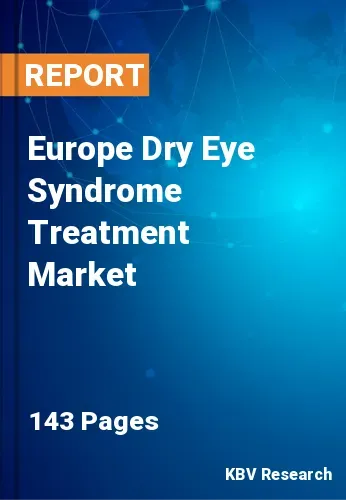The Europe Dry Eye Syndrome Treatment Market would witness market growth of 3.9% CAGR during the forecast period (2022-2028).
The cause of symptoms usually determines how to treat dry eye. Several alternative types of treatment are available to help and maintain the health of the eyes. Artificial tears are one such treatment option that is most frequently used to treat mild dry eyes. Additionally, some over-the-counter moisturizing gels and balms could provide some relief for the eyes. The eye doctor might prescribe lifitegrast (Xiidra) or cyclosporine (Restasis) if the dry eye condition is more severe. Both of these medications are eye drops that encourage the eyes to produce more tears.
The doctor could recommend modifications to help protect the eyes if something in life or the environment is causing or exacerbating dry eye. If tears are evaporating too quickly, the doctor may advise inserting punctal plugs into tear ducts. These plugs can block tears from running out of the eyes. When lower eyelids have become too slack, tears may drain from the eyes too quickly, which can lead to dry eyes. An eye doctor may recommend surgery to repair eyelids and assist tears to stay on the eyes if it is the reason for dry eye.
In Europe, between 11% and 30% of persons have dry eye illnesses. The population is aging and expanding, and more youth are being diagnosed as a result of increased screen usage, particularly as a result of the COVID-19 pandemic. Dry eye illness requires more attention. Key concerns include diagnosis and management, which present difficulties for both patients and their doctors. There are currently a variety of various diagnostic and therapeutic methods for the management of dry eye disease in Europe. For instance, several nations, like Germany, have already developed recommendations for the use of anti-inflammatory medication in the treatment of dry eye illness. These factors would escalate the growth of the regional market during the forecast period.
The Germany market dominated the Europe Dry Eye Syndrome Treatment Market by Country in 2021, and would continue to be a dominant market till 2028; thereby, achieving a market value of $414.9 million by 2028. The UK market is exhibiting a CAGR of 3% during (2022 - 2028). Additionally, The France market would experience a CAGR of 4.6% during (2022 - 2028).
Based on Type, the market is segmented into Evaporative Dry Eye Syndrome and Aqueous Deficient Dry Eye Syndrome. Based on Drug, the market is segmented into Restasis, Xiidra, Cequa, Eysuvis and Tyrvaya & Others. Based on Dosage, the market is segmented into Eye drops, Gels, Capsules & Tablets, Eye Solutions and Ointments. Based on Distribution Channel, the market is segmented into Retail Pharmacy, Hospital Pharmacy and Online Pharmacy. Based on Sales Channel, the market is segmented into OTC and Prescription. Based on Product, the market is segmented into Cyclosporine, Topical Corticosteroids, Artificial Tears, Punctal Plugs, Oral Omega Supplements and Others. Based on countries, the market is segmented into Germany, UK, France, Russia, Spain, Italy, and Rest of Europe.
Free Valuable Insights: The Global Dry Eye Syndrome Treatment Market will Hit $6.5 Billion by 2028, at a CAGR of 4.5%
The market research report covers the analysis of key stake holders of the market. Key companies profiled in the report include Johnson & Johnson (Johnson & Johnson Services, Inc.), AbbVie, Inc., Bausch + Lomb Corporation (Bausch Health Companies, Inc.), Novartis AG, Sun Pharmaceuticals Industries Ltd., AFT Pharmaceuticals, Santen Pharmaceutical Co., Ltd., Oyster Point Pharma, Inc., OASIS Medical, Inc., and Otsuka Pharmaceutical Co., Ltd.
By Type
By Drug
By Dosage
By Distribution Channel
By Sales Channel
By Product
By Country

Our team of dedicated experts can provide you with attractive expansion opportunities for your business.

